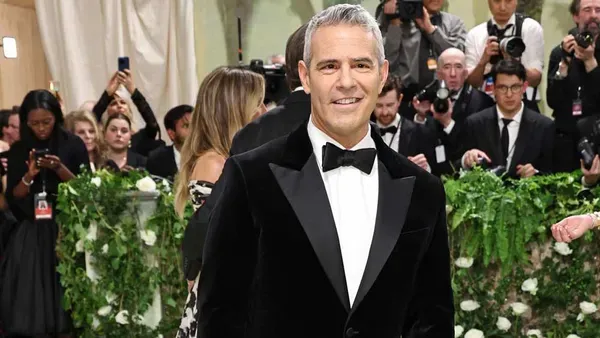
Apr 23
How Sarah Ruhl and Taylor Mac Bring 'Orlando' to Joyful Genderfluid Life
Frank J. Avella READ TIME: 14 MIN.
"Orlando" was light years ahead of its time (1928) in terms of its expansive, fluid, liberatory views of gender and sexuality... At times it feels as though we are only now catching up to Virginia Woolf." – Playwright Sarah Ruhl
There have been many adaptations across mediums of Woolf's seminal novel about the adventures of a young man who wakes up one day, a woman, including Sally Potter's celebrated 1992 film that starred Tilda Swinton.
The titular character is based on Woolf's lover Vita Sackville-West. Their relationship was explored by Eileen Atkins in her 1994 play "Vita and Virginia" that she starred in opposite Vanessa Redgrave in 1994. Based on their correspondences, the play was adapted into a 2018 film starring Gemma Arterton and Elizabeth Debicki.
Sarah Ruhl was commissioned to adapt "Orlando" a quarter century ago, by the Piven Workshop in Evanston, Illinois. The play bowed off-Broadway at Classic Stage Company in 2010. This latest Ruhl iteration, produced by Signature Theater, is the queerest, most buoyant version yet, and stars the extraordinary Taylor Mac.
This is an "Orlando" for our time, featuring a gender expansive cast and deft, time-trippy direction by Will Davis. Ruhl's transfixing script combined with Mac's subtle, yet penetrating embodiment delivers a window into the soul of of the epic, century-traveling heroine.
Mac has been super-busy of late. "Bark of Millions," judy's (Taylor's preferred pronoun) most recent work, premiered at the Sydney Opera House and then made its New York premiere at BAM. This summer the musical version of John Berendt's acclaimed novel "Midnight in the Garden of Good and Evil" will bow at the Goodman Theatre of Chicago with a book by Mac and music and lyrics by Jason Robert Brown.
Mac's many stage works include, "Joy and Pandemic," "Gary, A Sequel to Titus Andronicus" (Tony nomination, Best Play), "A 24-Decade History of Popular Music" (Pulitzer finalist), "Hir," and "The Lily's Revenge."
Ruhl, the recipient of numerous awards, is one of our most celebrated playwrights. Her work includes "Letters from Max," "The Oldest Boy," "Stage Kiss," "In the Next Room (or The Vibrator Play)" (Tony nomination for Best Play), "The Clean House" and "How to Transcend a Happy Marriage." In 2020 she collaborated with composer Matthew Aucoin on an operatic version of "Eurydice," her 2003 adaptation of the Orpheus and Eurydice myth, that premiered at the Los Angeles Opera in 2020 and the Metropolitan Opera in 2021.
EDGE had the double-pleasure of zoom chatting with these two extraordinary artists of the American theatre about their collaboration.

Source: Joan Marcus
EDGE: There is so much joy in this show.
Sarah Ruhl: I think joy is underrated in our culture. And we have been having a lot of joy at "Orlando," which has been good for my soul. I'm glad it's communicating to the audience, too.
EDGE: Sarah, you wrote the first adaptation about 25 years ago, and there have been a number of productions. Can you speak about the journey to this particular incarnation and how it's evolved?
Sarah Ruhl: Sure. I feel like the world is slowly catching up to Virginia Woolf. (laughs) Or at least part of the world... and then the other part of the world is deeply retrograde. It's a wonderful moment to do the play in terms of conversations around gender. 25 years ago, it was a different kind of conversation, both within the theater and outside of the theater. The journey to this particular production was partly me being rhapsodically, entranced, amazed when I saw Taylor do "A 24-Decade History of Popular Music" and thinking, "Oh my God, this is incredible." And Machine Dazzle's costumes and the sense of joy, play transformation, radicalism – (it displayed) a particular kind of connection with the audience that Taylor has. And I was like, "Oh my God, it would be incredible for Taylor to do 'Orlando' one day." (I thought) there's no way Taylor will ever do something that's not Judy's own work. But I was so delighted when it all came together.
EDGE: Taylor, what made you want to be a part of this?
Taylor Mac: I love being in other people's plays. I think that an ideal situation would be to do a play of mine that I'm in, a play of mine that I'm not in and somebody else's play every year. (laughs) That would be the magic sweet spot – a fantasy. It teaches you about your own writing and teaches you about performance, and also it opens up your consideration of the world to work that way... And the specific reason is because it's Sarah and "Orlando." I hadn't read the book, but when we did the reading of the play, I was just smitten.
Now I've read "Orlando." What is deeply profound to me is that there is a gentle queerness in Virginia Woolf's writing and in Sarah's interpretation of Virginia's writing. That's not something that you experience a lot, because queerness is so intent on surviving in terms in the media world. It's kind of in a capitalist rat race. (laughs) "Here we are! We're here! We're queer. Get used to it." That kind of loud and proud, which has been necessary and great and is part of our culture, but it's not often that you get to spend a little time just in gentleness. And we are a gentle people. So, I've just been really appreciative of that. It's really healing to be in this production.
EDGE: "Orlando" seems to return again and again, in various forms. We just had the documentary "Orlando: My Political Biography" and Neil Bartlett's play in London, Sally Potter's film back in the '90s. What do you think it is about "Orlando" that inspires creatives to want to return to it, explore it further and add to the canon?
Sarah Ruhl: It's such an interesting question. I mean, I think it's a masterpiece. That word is laden with all kinds of patriarchal weirdness, so forgive the term, but it's peeling back layers on an onion, and there's room for so many interpretations. I loved "Orlando: My Political Biography" which really took the lid off "Orlando" and created interesting tributaries around it... If a classic is a work that people continue to read, "Orlando" certainly is one. The way it talks about sexuality and gender with a kind of playful innocence is also healing... One thing that drew me to the novel initially was that it was a love letter – a gift from Virginia to Vita. For me, there's something about artworks that start as gifts from one real person to another that give it a shimmer all these years later and that we're still listening in on a primary relationship that was generous and generative...
I imagine Woolf was a very exacting person, an exacting writer. And in her lifetime, she would not have been that interested in "Orlando" having other voices interpreting the novel... But I hope that if she were ghosting around, it would give her pleasure, that there's a robustness and an openness, an enduring quality, that has enough openings for many people to interpret the work.

Source: Joan Marcus
EDGE: What has the collaboration with (director) Will Davis been like?
Taylor Mac: Will says that their job is a curator... And I think that that's true, they've curated a beautiful experience. They gathered together an incredible ensemble. We all just immediately connected on the first day, which doesn't always happen. Not to say that's always the goal, or the sign of a positive experience. (laughs) But it was. I feel really instinctually emotionally connected all these people. Will has the thoughtfulness to consider things that another director might just dismiss... They clearly have a beautiful aesthetic. It's nice to be in an elegant production that doesn't feel oppressive because sometimes a minimalist design feels heavy with its exactitude. I don't I don't feel that here.
Sarah Ruhl: I feel I found a collaborator I would love to work with again... I loved working with him and the company-mindedness that was in the room was fantastic. Will deeply values ensemble, which was wonderful for this particular play... Working with Will was a real inspired reminder of these little filaments of joy in the theater that we get to come to work and experience.
EDGE: Taylor, as a dramatist, when you're acting in someone else's work, do you ever feel like you want to make changes to it? Not to Sarah's work, of course, but in other productions. Is making that separation easy for you?
Taylor Mac: Yeah. I mean I think it is. (laughs)
Sarah Ruhl: It is. Totally.
Taylor Mac: I think of playwriting as offerings. I think of all the different departments in the collaborative as offerings... So my feeling is the spirit of the gathering is everybody brings their offering... And that's part of the joy of it... It's a great relief to also not have to be the playwright and the producer and the director. It's really fun for me to just concentrate on one job. But, also, if an actor is busy rewriting the play, then they're not spending time considering the play. They're not spending time wondering about their character within the circumstance of the play. That's how I was trained as an actor – to not judge the material, but to engage and to make my offering to the material which is my performance. The more you try to fix something, the less you're listening... I might discover something in my performance in response to what Sarah has written that makes me alter my perform my offering. And that happens almost every single performance... Last night I just discovered so much stuff that I didn't know about the play. And it's a great delight.
EDGE: One of the things I loved so much about your performance, Taylor, was how subtle it was.
Taylor Mac: (laughs) Words never spoken!
EDGE: There was so many layers you were exploring.
Taylor Mac: The great joy of this particular play is that it goes through the centuries. You can use the various acting styles through the centuries as an anchor. There's the restoration style and that bombastic, declarative style of the 18th century, and then the melodrama of the 19th century. And then the realism of the 20th century. That's how I crafted the performance. I didn't stitch it to all of those. I just anchored it a little bit. So, it allows for everything. And subtlety has always been part of my work, but people don't always notice. (laughs)
Sarah Ruhl: I think that it's an extraordinary thing, Taylor, that you're one of the few actors I know who can weave in and out with no transition between styles and drop in deeply within a style. And then cast it off and be, as you said, in realism in the 20th century... There's not a single moment on stage that's not considered and deeply felt in the moment.
Taylor Mac: It's easy when the material is good and when the material isn't tying you down. Sarah writes poetry, so that allows you to find your way inside the mystery of it. And to be alive inside of the mystery of it. It's really a gift.
Frank J. Avella is a proud EDGE and Awards Daily contributor. He serves as the GALECA Industry Liaison and is a Member of the New York Film Critics Online. His award-winning short film, FIG JAM, has shown in Festivals worldwide (figjamfilm.com). Frank's screenplays have won numerous awards in 17 countries. Recently produced plays include LURED & VATICAL FALLS, both O'Neill semifinalists. He is currently working on a highly personal project, FROCI, about the queer Italian/Italian-American experience. He is a proud member of the Dramatists Guild. https://filmfreeway.com/FrankAvella https://muckrack.com/fjaklute







